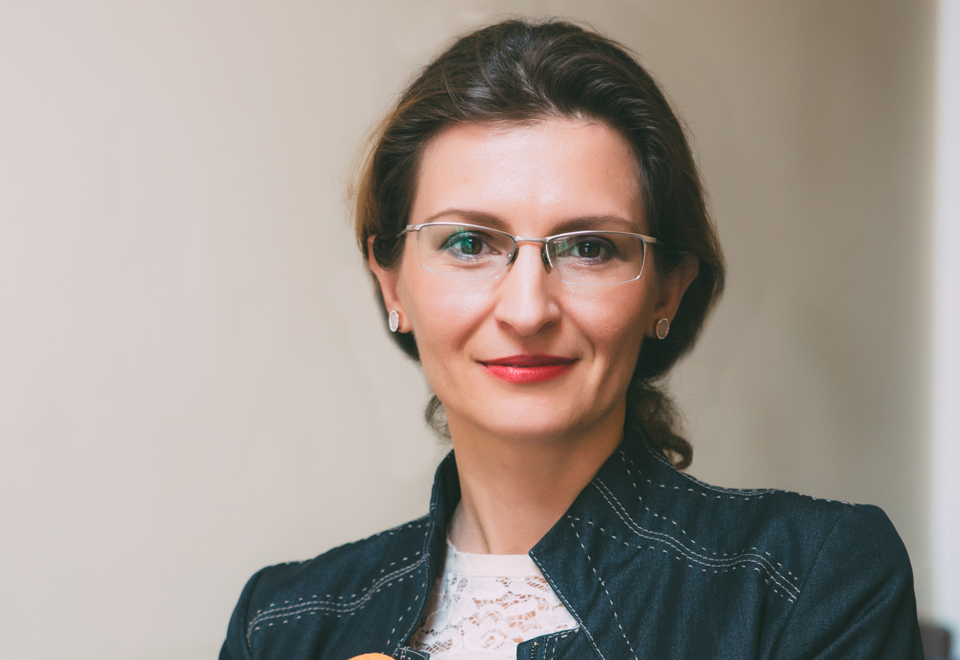Take five: “Data-driven initiatives are crucial to meeting women survivors’ needs in a world of limited resources”
Date:

Elma Tershana is the Executive Director of Observatory for Children and Youth Rights, a civil society organization from Albania that has created better mechanisms to collect information on the situation of children's rights acrossthe country. In the last few years, within the UN Women regional programme “Implementing Norms, Changing Minds,” funded by the European Union, the organization also extended its work in data collection to better understand the situation of violence against women and girls across the country. In this interview, Tershana talks to UN Women about why data collection is vital to ending violence against women and how it can improve support for women survivors of violence.
Why is data collection important in your work, and how do you use it when designing initiatives?
For over a decade, our organization has monitored the situation of children in Albania by collecting disaggregated data at the sub-national level on issues related to health, population, social protection and education. This wealth of statistical information is consolidated in a user-friendly interface accessible online. Complemented by other tools, such as survey-generated evidence, we produce, advocate for, and make use of scientific evidence for the formulation of results-based policies that center child and youth rights. This is because, when designing interventions, data directs us to the most pressing challenges facing our beneficiaries. Without data, we are shooting in the dark and hoping for the best. Data provides us with a framework for identifying social problems, designing interventions that directly respond to those problems and measuring the impact of those interventions.
How has your organization or beneficiaries benefited from data collection?
I can share an anecdote from our fight against early child marriage —a phenomenon still present in Albania. In 2014, while we were in communication with local authorities and schools for data collection, many teachers and students revealed that promising girls into marriage at a very early age is a common attitude and routine community custom. In one city, it was reported that almost 80 per cent of girls in middle school were engaged, meaning that hundreds of underage girls were promised into marriage. As we were tracking the facts, more and more cases came to our attention. This made us re-think the way of doing things, and since that time, we have used this data to produce studies, analyses and cases, as well as to advocate with government officials to address this concerning phenomenon.
Furthermore, we worked closely with judges and prosecutors to enhance their understanding of early marriages and how to adjudicate cases presented in court, while at the same time working to increase awareness of the harmful impact of early marriages within local communities.
How did data collection inform your understanding of the situation of violence against women and girls in Albania?
In the framework of the regional programme,we have collected baseline, mid-term, and end line data on peoples’ perceptions on gender equality, gender roles and violence against women and girls in Albania. Responses we received from those surveyed informed the design of a nationwide campaign that targets one specific behavior: lack of reporting of cases of violence, not only by survivors themselves but also bystanders.
The more we work on data on peoples’ reactions towards violence against women, the more we are convinced that the path to eliminating it is long and arduous. We must urgently speed up our efforts to assist women and girls by providing protection and support. As domestic violence is still considered a ‘family matter,’ women often suffer in silence without having support or encouragement to report and be free from abuse.
How can data collection support policymaking and its implementation to address violence against women?
Even though Albania has comprehensive laws and by-laws that align with international and EU standards, in reality, the protection systems for women who have suffered abuse remain infantile and without proper financing. Using a data-driven process, from the early planning stages to monitoring processes, makes the policies more visible, sustainable, and useful for the women who suffer from violence. Data can help to target policies and interventions to those who really need it, which is crucial in a world of limited resources. Data collected at the implementation phase of a policy especially helps in understanding the flaws of the policy and how to improve it in the future.
Taking into account your expertise in data collection, how important is it for your organization to be at the table where the decisions affecting women survivors of violence are taken?
Decisions affecting women survivors need to be taken within a multisectoral approach, by including various actors that work in the field. During the implementation of our project, supported by UN Women and funded by the European Union, we collected data over the span of three years, which measured attitudes, perceptions and behaviors around gender equality and gender-based violence. More than three-quarters of respondents feel that abused women should not seek help from the police. Women’s and men’s perception of each other’s role in society was also telling: 1 in 3 respondents believe that women belong in the household sphere, while men should pursue careers and leadership opportunities. If evidence-based policies are to be designed, it is crucial that women’s organizations like ours, who are closest to the beneficiaries and the data, form a critical part of the decision-making table. They bring the voices of women who are excluded, isolated and who feel left behind.